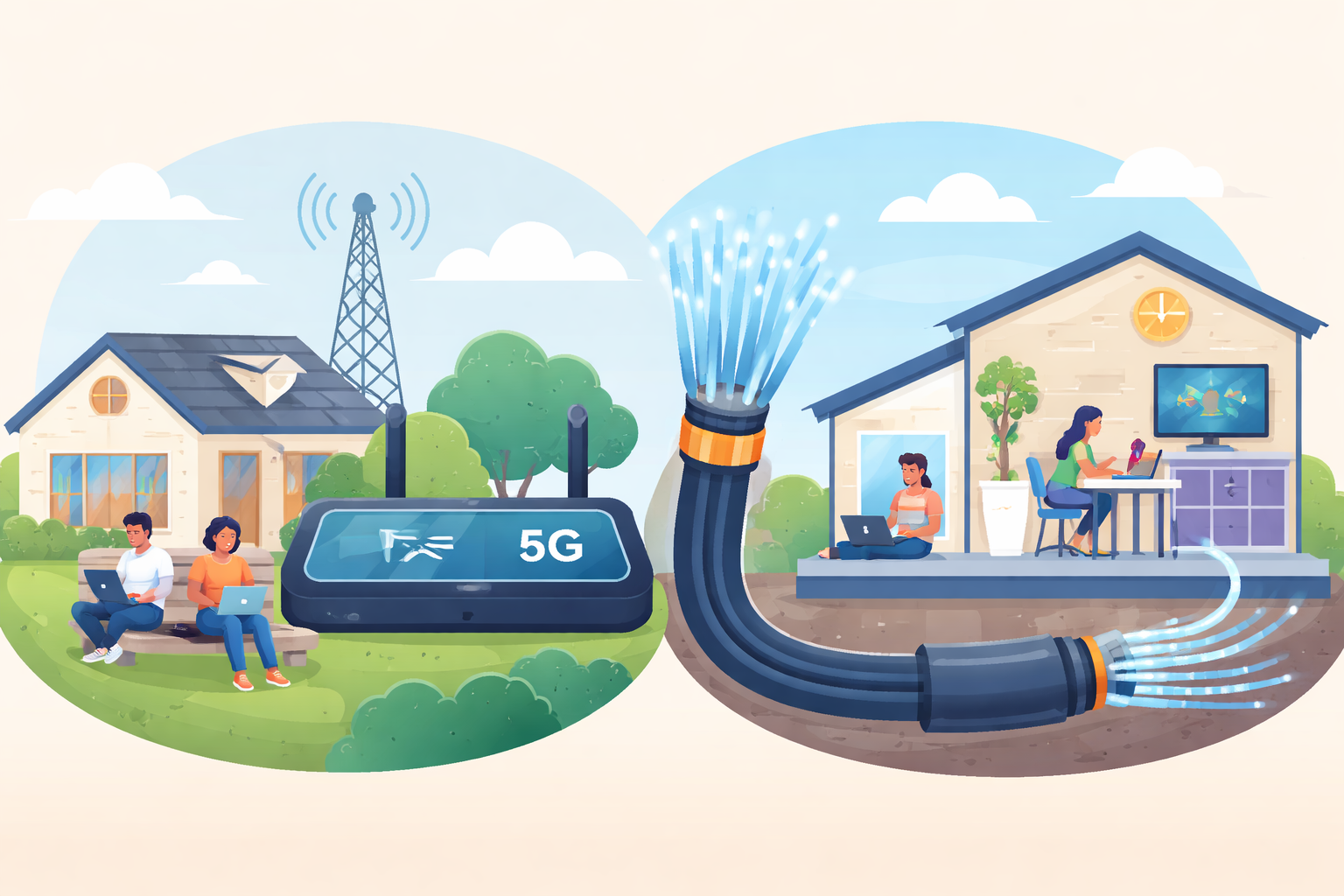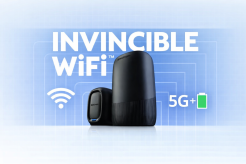How to Decide Between Mobile Broadband and Fiber for Your Home

When it comes to choosing the best internet for your home, the options can be overwhelming. Two of the most popular choices today are mobile broadband and fiber internet. Each comes with unique advantages, costs, and performance levels. Understanding the differences between them can help you make an informed decision that suits your household’s needs and lifestyle.
Whether you stream movies, play online games, or just need reliable connectivity for work and school, selecting the right service can make a big difference in speed, stability, and overall satisfaction. In this article, we’ll explore the key factors you should consider when deciding between mobile broadband and fiber, so you can make the best choice for your home.
Understanding Mobile Broadband
Mobile broadband is a type of internet service that connects your devices to the internet through cellular networks. Unlike traditional wired connections, mobile broadband does not require physical cables to reach your home. This makes it highly flexible, especially for households that move frequently or live in areas where wired internet infrastructure is limited.
Mobile broadband can be accessed through portable hotspots, USB modems, or even directly on your smartphone. Providers offer a range of plans that vary by data allowance and speed. While mobile broadband can be convenient, it’s important to understand its limitations.
Pros of Mobile Broadband
- Portability: You can use mobile broadband anywhere within network coverage, which is ideal for flexible lifestyles or remote locations.
- Easy setup: No installation of cables or technicians is required. You can typically start using the service within minutes.
- Variety of plans: Many providers offer plans with different data limits, speeds, and pricing, allowing you to find one that fits your budget.
Cons of Mobile Broadband
- Data caps: Most plans have monthly data limits, which can become costly if you stream videos or download large files regularly.
- Variable speeds: Mobile broadband speeds can fluctuate depending on signal strength, network congestion, and your location.
- Latency issues: Online gaming or video conferencing may experience delays due to higher latency compared to wired connections.
For more details, you can check how mobile broadband works and compare different plans to see if it aligns with your home needs.
Understanding Fiber Internet
Fiber internet uses fiber-optic cables to deliver extremely fast and stable internet connections. Unlike copper or mobile networks, fiber transmits data using light signals, which makes it one of the most reliable options available today. If your household requires high-speed connectivity for multiple devices, streaming, or gaming, fiber is often the better choice.
Fiber internet is becoming increasingly widespread, though availability may still be limited in some rural or remote areas. Installation usually requires a professional technician, but the payoff is a consistently high-performing network.
Pros of Fiber Internet
- High speeds: Fiber can reach gigabit speeds, making it ideal for heavy streaming, online gaming, and working from home.
- Reliable connection: Fiber is less affected by weather conditions or distance from the provider, ensuring stable internet performance.
- Unlimited data: Many fiber plans offer unlimited usage, eliminating worries about overage fees.
Cons of Fiber Internet
- Limited availability: Fiber networks are still expanding, and not every neighborhood has access yet.
- Installation time: Setting up fiber requires professional installation and may involve digging or running new cables.
- Higher cost: While prices have become more competitive, fiber is generally more expensive than basic mobile broadband plans.
To explore options in your area, you can learn more about fiber internet services and compare what fits your household.
Key Factors to Consider When Choosing Between Mobile Broadband and Fiber
Choosing between mobile broadband and fiber involves evaluating several factors, including speed, reliability, cost, and usage habits. Here’s a closer look at what to consider:
1. Internet Speed Requirements
Ask yourself how much speed your household truly needs. Mobile broadband typically ranges from 5 Mbps to 100 Mbps depending on the network, while fiber can exceed 1,000 Mbps. For heavy streaming, video calls, and gaming, fiber often provides the speed necessary to keep multiple devices running smoothly.
2. Household Usage
The number of users and devices in your home plays a critical role in your decision. A single user who mainly browses the web may find mobile broadband sufficient. However, if you have a family with multiple devices streaming, gaming, or working from home, fiber is better suited for consistent performance.
3. Cost and Budget
Mobile broadband usually comes with a lower monthly fee, but the cost can add up if you exceed data limits. Fiber may have a higher upfront cost and monthly bill, but unlimited data plans and faster speeds often justify the investment. Consider your long-term needs and compare total costs, including installation fees.
4. Availability in Your Area
Fiber availability is still growing, so not every area is serviced. Mobile broadband can reach areas without wired infrastructure, making it a practical solution where fiber is unavailable. Checking local coverage maps or provider websites can clarify which options are feasible.
5. Reliability and Stability
If you live in an area prone to network congestion or weather interruptions, fiber usually offers a more reliable connection. Mobile broadband is subject to network fluctuations, so reliability can vary depending on signal strength and peak usage times.
Making the Right Choice
To decide between mobile broadband and fiber, start by evaluating your household’s daily internet habits and requirements. Consider the following approach:
- Identify your primary internet use: Streaming, gaming, working remotely, or casual browsing will dictate speed needs.
- Assess the number of devices: More devices require a stronger, stable connection, often favoring fiber.
- Check local availability: Use provider resources to determine whether fiber or mobile broadband is feasible in your area.
- Compare costs: Factor in monthly fees, installation, and potential overage charges to determine the most cost-effective option.
- Think about future-proofing: Investing in fiber now may save you from needing to upgrade as internet demands increase.
By weighing these factors, you can choose a solution that balances performance, cost, and convenience. Some households even opt for a hybrid approach, using fiber as the primary connection and mobile broadband as a backup for mobility or emergencies.
Why Your Choice Matters
Selecting the right internet service goes beyond convenience. A stable, high-speed connection affects productivity, entertainment, and communication. Fiber internet can enhance experiences for streaming, video calls, and online learning, while mobile broadband offers flexibility for users who need connectivity on the go.
Ultimately, your choice should match your lifestyle and household demands. Taking the time to evaluate options ensures you won’t encounter frustrating slowdowns or unexpected bills, giving you a seamless internet experience for years to come.
Related Posts
 Internet Bundles
Internet Bundles
Facts About Youtube That May Surprise You
Discover updated YouTube facts, user statistics, revenue insights, and video trends shaping global content consumption and digital marketing strategies today.
 Internet Bundles
Broadband Installation
cheap internet deals
Internet Bundles
Broadband Installation
cheap internet deals
Simple Steps to Self-Install Spectrum Internet Fast: 2026 Guide
Learn how to self-install Spectrum Internet step-by-step. Save installation fees, activate service fast, and optimize WiFi performance with this complete guide.
 Internet Bundles
Internet Bundles
Why High-Speed Business Internet Matters More Than Ever
Discover why high-speed business internet drives productivity, security, and revenue growth, and how to choose the right provider for long-term success.
 Wifi
Technology
Wifi
Technology
Spectrum INVINCIBLE WiFi: Stay Connected During Outages
Discover how Spectrum INVINCIBLE WiFi combines WiFi 7, 5G backup, and battery protection to keep your home internet running during outages and disruptions.
 Internet Bundles
Broadband Deals
Internet Bundles
Broadband Deals
Best High-Speed Internet Plans for 2026
Discover the fastest high-speed internet plans. Compare fiber and cable options, speeds, and pricing to find the perfect plan for your home or business.